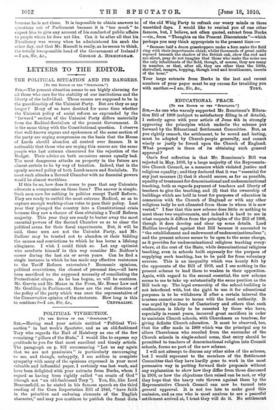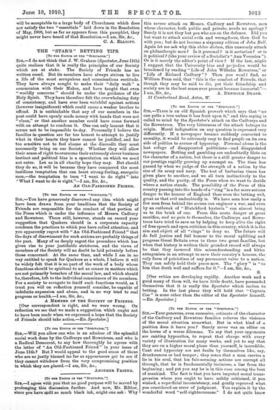EDUCATIONAL PEACE.
LTo Ms EDITOR 0/ TYR " SPECTATOR:1 SIR,,—As one who warmly supported Mr. Runciman's Educe. tion Bill of 1908 (subject to satisfactory filling in of details), I entirely agree with your article of June 4th in strongly approving the principles which underlie the scheme put forward by the Educational Settlement Committee. But, as you rightly remark, the settlement, to be sound and lasting, must be adopted by Church-people generally, and cannot wisely or justly be forced upon the Church of England; What prospect is there of its obtaining such general approval ?
One's first reflection is that Mr. Runciman's Bill was rejected in May, 190S, by a large majority of the Representa- tive Church Council, as a measure which violated justice and religious equality ; and they declared that it was " essential for any just measure (1) that it should secure, as far as possible, equality of treatment for denominational and undenominational teaching, both as regards payment of teachers and liberty of teachers to give the teaching, and (2) that the ownership of buildings which are held in trust for purposes of education in connexion with the Church of England or with any other religious body be not alienated from those in whom it is now vested." I fear that this new scheme does little or nothing to meet these two requirements, and indeed it is bard to see in what respects it differs from the principles of the Bill of 1908, though it does develop and clear up some details. Lord Halifax inveighed against that Bill because it amounted to " the establishment and endowment of undenominationalism "; and the present scheme seems to be open to the same charge, as it provides for undenominational religious teaching every- where, at the cost of the State, while denominational religious teaching, even in schools built expressly for the purpose of supplying such teaching, has to be paid for from voluntary sources. This is an inequality which was keenly felt by the opponents of the Bill of 1908, and I see nothing in the present scheme to lead them to weaken in their opposition. Again, with regard to the second_ essential, the new scheme seems to me to take up substantially the same position as the Bill took up. The legal ownership of the school-building is not interfered with, but the fight to use it for educational purposes is to be withdrawn if after a certain interval the trustees cannot come to terms with the local authority. It was urged by the Dean of Canterbury and others that such confiscation is likely to be resented by those who have, especially in recent years, incurred great sacrifices in order to maintain Church schools, with Churchmen as teachers, for giving definite Church education. It must be observed, too, that the offer made in 1908 which was the principal sop to allure Churchmen who recoiled from the surrender of the Church schools in single-school areas, that entry should be permitted to teachers of denominational religion into Council schools, forms no part of the new scheme.
I will not attempt to discuss any other sides of the scheme, but I would represent to the members of the Settlement Committee that they have hardly gone to work in the most persuasive way in putting forward their proposals without any explanation to show how they differ from those discussed in 1908, or how the objections then raised can be met, or why they hope that the heavy vote thrown against them by the Representative Church Council can now be turned into general approval. It is not too late to make good this omission, and as one who is most anxious to see a peaceful settlement arrived at, I trust they will do it. No settlement will be acceptable to a large body of Churchmen which does not satisfy the two "essentials " laid down in the Resolution of May, 1908, but as far as appears from this pamphlet, they might never have heard of that Resolution.—I am, Sir, &c., C. A. ELLioTT.











































 Previous page
Previous page